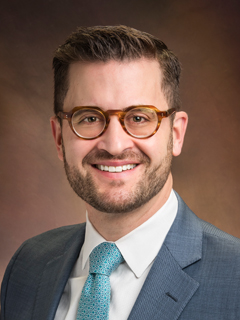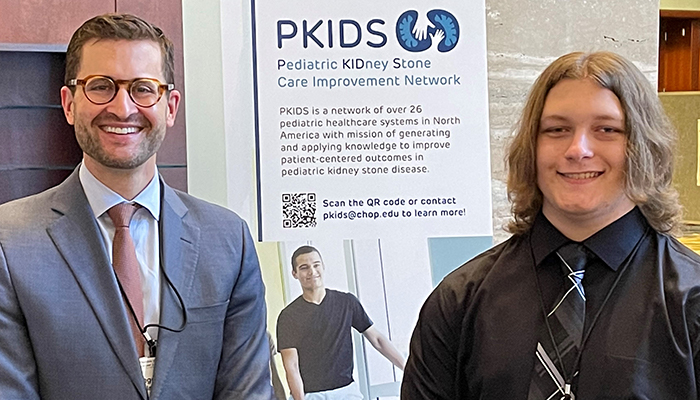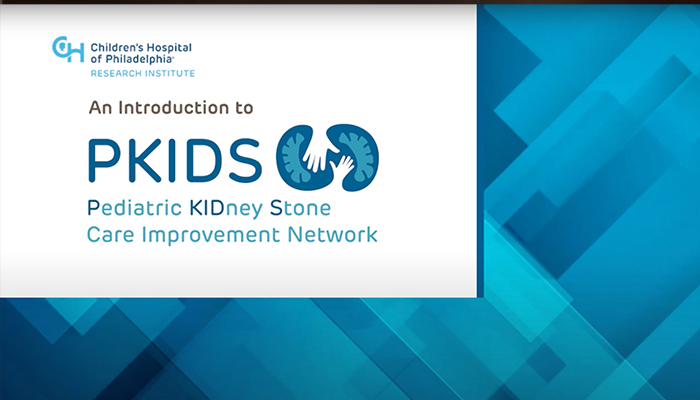HOW CAN WE HELP YOU? Call 1-800-TRY-CHOP
In This Section
Knowing What Matters Most to Patients is Key to Pediatric Kidney Stone Research

PKIDS is leading the paradigm shift to collaborative, partnership-based, and patient-centered kidney stone research.
mccannn [at] chop.edu (By Nancy McCann)
Just two years new, the Pediatric KIDney Stone (PKIDS) Care Improvement Network is a community of patients, caregivers, and clinicians determined to improve the lives and outcomes of children and young adults with kidney stone disease. By leveraging a network of over 25 pediatric healthcare systems in North America and creating an interactive environment to generate and apply knowledge that improves outcomes most important to patients, PKIDS is leading the paradigm shift to collaborative, partnership-based, and patient-centered kidney stone research.

Greg Tasian, MD, MSc, MSCE
"Patient-centered research is the future of clinical research," said PKIDS Founder and Director Greg Tasian, MD, MSc, MSCE, an attending pediatric urologist and world-renowned pediatric kidney stone expert at CHOP's Pediatric Kidney Stone Center. "It's important and essential to partner with patients and incorporate their voices in clinical care."
Dr. Tasian and his team place patients and their caregivers at the center of the PKIDS Network. Patient and family partners, comprised of adolescents who have undergone kidney stone surgery, their caregivers, and the caregivers of younger children who have kidney stones, are an integral part of the organization structure of PKIDS and are instrumental in helping to design research.
"PKIDS at its core has turned around the way we conduct research and surgery," Dr. Tasian said. "We turn to our patient and family partners to learn what are the questions we should be asking and what outcomes we should be measuring."
Because PKIDS generates evidence directly from patient care, the results that are shown to improve outcomes are more readily applied back into care.
"It's not just getting to the evidence," Dr. Tasian said. "It's getting to the outcomes that matter most to patients. In PKIDS, we apply this evidence using a rigorous approach that includes principles of implementation science, including transparency, dissemination, and continuous assessment. Through this approach, we will continually refine processes and techniques to improve outcomes that matter the most to patients."
Listening to Patient and Family Partners

Dr. Greg Tasian with patient Hunter Beck, who shared his living-with-kidney-stones story at the Societies for Pediatric Urology meeting.
One of those patients is Hunter Beck, who was diagnosed with kidney stone disease when he was 14-years-old. After an ultrasound determined there was a 17 mm stone present, Beck underwent an ureteroscopy with laser lithotripsy, an endoscopic outpatient procedure to remove the dime-sized stone. Over the next few years, Beck had two shockwave lithotripsies targeting smaller stones. This noninvasive outpatient procedure uses shockwaves generated outside the body to fragment the stones, which are then expelled in the urine.
As a patient-partner, Beck offered much insight as to what it was like for a teenager to be experiencing kidney stones and kidney stone treatment. For example, urinary catherization is a routine and necessary procedure used to help empty the bladder, but it was a traumatic and scary event from Beck's perspective, someone who had never encountered it before.
"Having a conversation is really important because it can lead to other conversations that can help with research," Beck said "A patient might say something and not think it's very important, but the doctor may say, ‘Hey, we should expand on that. We should explore that avenue.'"
Beck is 18 now, in his senior year of high school, and looking forward to prom and graduation in the months ahead, especially since he's one-year free of kidney stone symptoms and pain. In December 2021, Beck traveled to Miami for the Societies for Pediatric Urology fall meeting where, in front of hundreds of attendees, he told his story and spoke of the value of sharing his experiences as a PKIDS patient-partner.
"When you have a patient-centered partnership, you're not just a number on a page, you're not just some data point," Beck said. "It's all about being heard. That's really the message of PKIDS — being a patient and having your voice heard."
PKIDS Studies in the Works

Watch this brief PKIDS video to learn more.
With a project grant from the Patient-Centered Outcomes Research Institute (PCORI), Dr. Tasian is leading a clinical trial to determine the effectiveness of three different approaches in removing kidney stones (ureteroscopy, shockwave lithotripsy, and percutaneous nephrolithotomy), and how these procedures affect patients' lives.
"Stone clearance is identified as important by patients," Dr. Tasian said, "because if there are residual stones after a surgery, then that can lead to future stone growth that can lead to those stones moving and causing symptoms, and ER visits, and more."
The study follows patients (ages 8 to 21) for three months after they have received one of the three procedures. And it's this lived experience after surgery — which can include pain, anxiety, psychological stress, and other quality-of-life measurements — that the researchers are keen to learn about, as there is little knowledge of it at present.
"There are competing experiences after surgery," Dr. Tasian said, "as well as potential differences in stone clearance based on size, location of stone, and patient characteristics that this trial is designed to unravel and provide clarity around."
The PKIDS research team is currently recruiting for this study. For more information, contact Study Coordinator BagleyK1 [at] chop.edu (Krystal Bagley).
Also funded by PCORI is a new study called PRACTICAL, designed to create a patient-prioritized research agenda for clinical trials in kidney stone disease. As part of this study, PKIDS researchers are reviewing what trials have already been conducted. At this point, approximately 90% of clinical trials have been done in surgical interventions and just a smattering of studies on the other vast amount of important information such as medical management of kidney stones, kidney stone prevention, and adherence to therapy.
"In the initial review, it's just so clear that there have been many trials conducted in a very narrow part of stone disease and very few in the remainder," Dr. Tasian said. "This again reflects the biases of the investigators, surgeons, and clinicians, rather than having the needs arise from the patient population."